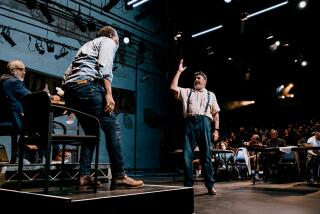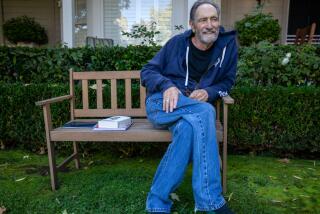Irvine Man, 100, Beats the System
- Share via
People who beat the system always fascinate me, and T. Carleton (with an e , he points out) Thompson of Irvine just beat one of the toughest systems of all: the life insurance actuarial tables. Since this was the first time such a thing had happened in its 121-year existence, Pacific Mutual Life Insurance Co. was impressed enough to throw a lunch for Thompson last week at its Fashion Island headquarters.
At the dessert course, Pacific Mutual’s executive vice president, Arthur Kesselhaut, presented Thompson with a check for $12,000 (Thompson had paid in $5,000 on the policy). This is what Thompson’s beneficiary would have received if Thompson had died when the tables said he should. But Thompson turned the tables, outlived the contract and collected his own death benefit because he passed his 100th birthday last Christmas.
I stopped by Thompson’s Irvine townhouse the other night, ostensibly to see how he was dealing with all this attention but actually to gather a few tips on how you go about living to be 100. I’m not sure at this point I really want to, but I might feel differently in a few years. So whatever edge I can acquire now could be useful up ahead.
Thompson answered the door himself. He shares this home with his divorced daughter, Phyllis Beck, a library administrator at UC Irvine (“I go 50-50 with my daughter on the house”). Thompson looks exceedingly spry, although he claims that his equilibrium betrays him if he doesn’t do things very slowly. He has his hair, a keen and observant eye, and a sharp mind. He is remarkably self-sufficient and carries himself with an impressive air of dignity.
We talked in his living room while various members of a large family--he has three children, 10 grandchildren and 12 great-grandchildren--dropped in and out of the house. His only obvious difficulty is hearing. With the help of hearing aids, he can hear if a visitor looks at him directly and sits close. Although he has trouble making out voices on TV, he can hear Vin Scully on the radio and so watches his beloved Dodgers on TV while he listens to Scully describe the game on the radio.
We disposed of history first. Thompson was born on an Upstate New York farm on Christmas Day, 1888. The family moved to Poughkeepsie when Thompson’s father became ill, and his mother had to support the family by running a boardinghouse. “We were always poor,” Thompson recalls, “and I had to start working when I was 12.” During World War I, Thompson and his brother discovered that there was money to be made taking group photographs of U.S. soldiers, and it was the start of a lifetime work.
When Thompson’s wife developed tuberculosis, he moved his family to Los Angeles in 1921 and started a photography business in Glendale that still thrives today, although Thompson sold out when he retired in 1968. He and his wife, Adele, lived in Leisure World for 6 years, until she became seriously ill. That’s when they both moved in with their daughter in Irvine. Adele Thompson died 5 1/2 years ago at the age of 91.
With history offstage, we turned to the heavy stuff. I’ve always looked to George Burns as a geriatric role model, but he seems to inhabit another planet. I needed someone more accessible to tell me that it was possible to achieve 100 years and still knock off two martinis daily, eat rare steak three times a week and exercise by watching pro football on television.
No such luck. Thompson neither smokes nor drinks (“Oh, I suppose I’ve taken a glass of wine a few times at a swell dinner”) and can’t remember the last time he ate red meat. He is into health food the way Burns is into cigars, and he goes through a regular daily exercise regimen.
Thompson is up every morning at 6 and does his exercises while his daughter gets ready for work. Then he spends most of the morning preparing his breakfast, a mixture of grains he buys in health food stores and cooks with bananas in a double boiler. At 11 he retires to his room to work on his financial accounts, answer his mail and write cards to his grandchildren and great-grandchildren. When he finishes, it is time to start preparations for dinner. In between, he does a lot of reading, keeping up on current affairs, about which he talked knowledgeably.
So much for dissipation as a route to longevity. What, then, about philosophy?
Asked if he thought very much about death, he said, “Are you asking if I’m afraid of dying?” He then went on to explain that he isn’t.
“At my age, there get to be so many physical problems that I wouldn’t mind if I just went to bed some night and didn’t wake up--although I’d like to wait until I get my taxes prepared for this year. And my first great-grandchild is getting married in March, so I’d like to see my first great-great-grandchild.”
He doesn’t regard reaching the century mark with the same gravity as one of his Dodgers hitting .300 or pitching 20 wins. “It wasn’t a goal for me,” he said, “and not particularly more important than any other birthday. I had no real hope I’d ever live to 100, so I would have been perfectly happy to leave at 99. I just sort of slipped into it.”
Any advice for the young ones out there who would like to emulate his achievement?
He thought that over for a while. “I think two things that helped me were staying slim and working very hard all my life. I’ve always been more or less skinny.” Pause. “I guess I’d tell a young man today that the family is the most important thing. I’d tell him he’s going to do better in life if he’d join a good church and meet a girl there and marry her.”
It certainly worked for T. Carleton Thompson.


